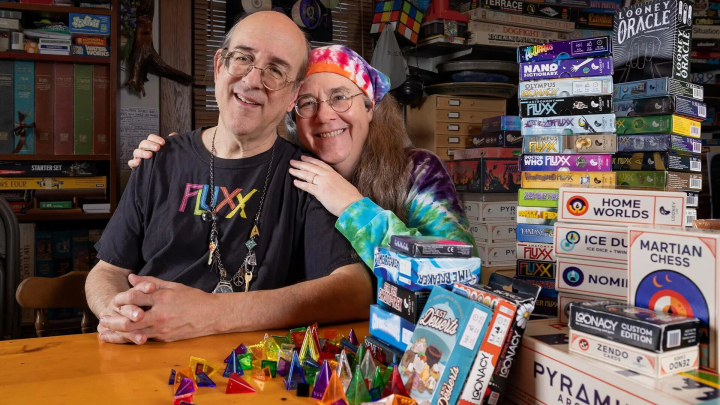Wild Cards
Andy Looney (B.S. ’86, computer science) sometimes wonders what his life would look like if he’d been born with a different last name. Would he have devoted his personal and professional ambitions to the wide world of whimsy as a Jones or a Smith? Which came first—the name, or the yearning for an off-kilter existence?
Either way, Looney’s fate was sealed during the summer of 1986 when he met a “hippie chick who doesn’t wear shoes” named Kristin Wunderlich (B.S. ’88, computer science) working at NASA’s Goddard Space Flight Center. Her path was preordained as well: In German, “Wunderlich” means eccentric, odd, quirky.
Together, Looney and Wunderlich—long since married and jointly the Looneys—have lived up to the promise of their names. They are the chief creative officer and CEO, respectively, of Looney Labs, the game company behind the card game Fluxx, which has sold more than 4 million copies since its 1997 introduction and spawned spinoffs like Around the World Fluxx, Monster Fluxx and Nature Fluxx.
The game is simple, in theory: Each player starts with three cards and on each turn, draws one and plays one. The game is formless until some cards are played, setting objectives and rules. Each card played reshapes the game. Some introduce a new rule, like “play three” or “draw two.” Others set a new goal that changes the object of the game.
“What got me was the twist, which is there are no rules until you play (a card with) rules, and there’s no way to win until you play a way to win,” says Mike Webb, vice president of sales and e-commerce at game publisher Paizo, who first met the Looneys in the late 1990s while at a different company that distributed Fluxx. “That was just utter genius, and it’s something that made the game have instant appeal to folks.”
Fluxx, Looney Labs’ biggest hit, isn’t Risk, or Magic: The Gathering or Dungeons & Dragons. It doesn’t require players to dedicate hours, or learn an intricate set of rules, or create a backstory for their characters. The game can take as little as 10 minutes, and its strategies are limited.
“One of the most basic breakdowns I like to use (to describe the spectrum of games) is what I call zany or brainy,” says Andy. “Fluxx is very chaotic. So that represents the zany side of gaming.”
Draw some cards, and hop on the Looneys’ zany ride.
Starting Hand: Andy Looney, Kristin Looney, Wunderland
Knock on the door of the lilac-colored house off Rhode Island Avenue in College Park, and Andy Looney might answer the door barefoot, wearing a purple robe, gray hair tied in a long ponytail: one part Gandalf, one part The Dude from “The Big Lebowski,” and one part cleaned-up Jerry Garcia.
Nicknamed Wunderland as a play on Kristin’s maiden name, the house is the de facto headquarters of Looney Labs. (The Looneys rent office space nearby, but since the pandemic rarely use it for more than storage.) To an outsider, the home might look like the warren of a Settlers of Catan-loving packrat—seemingly every inch of it not crucial to functions like walking or cooking is crammed with board games, books, arcade games, collectible figurines. “He does know where everything is,” says Kristin.
Kristin has her own signature look: a tie-dyed bandanna covering her hairline, wavy brown hair tumbling down her back, a tie-dyed shirt doubling down on the vibe.
She’s the warm, focused extrovert to Andy’s sharp, roving-brained introvert. When he thinks of a book that they studied in their early days of game creation (“Gameplan: The Game Inventor’s Handbook”), he wanders off to find the paperback on the packed shelves. Kristin continues the story they’d been telling, happily pausing when Andy comes back to show the exact chapter he was referring to.
“Andy is a person who has wild ideas, and Kristin is a person who can figure out how to make them real,” says Keith Baker, a friend who first met Andy at science fiction conventions in the 1980s. “She’s very whimsical and funny, but she balances that with an amazing sense of how to solve problems and get things done.”
Click HERE to read the full article
The Department welcomes comments, suggestions and corrections. Send email to editor [-at-] cs [dot] umd [dot] edu.
